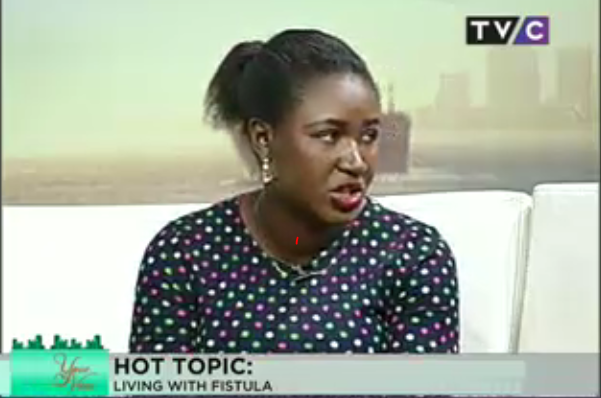 TVC N. A survivor of Veisco-vaginal fistula (VVF) Biodun Megbai, has said, she regret her choice of child delivery, as she chose to go visit the native doctor who took her delivery instead of adhering to the Medical doctor that suggested Caesarean section because of the heavy weight of her unborn child.
TVC N. A survivor of Veisco-vaginal fistula (VVF) Biodun Megbai, has said, she regret her choice of child delivery, as she chose to go visit the native doctor who took her delivery instead of adhering to the Medical doctor that suggested Caesarean section because of the heavy weight of her unborn child.
During the discussion segment of YourView today, she recounts her ordeal. Narrating how the fear of going through a C-Section for her first pregnancy led her to having the fistula problem. ”I have been moving from one hospital to another for series of surgical operation and then finally I was transferred to Ibadan where I met aunty Faith who paid all my hospital bill”.
She also said, her friends and family especially her husband stood by her all through the trial period.
 Advocate VVF Faith Fookes, who was a guest on YourView Tvc explained Fistula as an abnormal or surgically made passage between a hollow or tubular organ and the body surface, or between two hollow or tubular organs. She also said most of these are caused during delivery.
Advocate VVF Faith Fookes, who was a guest on YourView Tvc explained Fistula as an abnormal or surgically made passage between a hollow or tubular organ and the body surface, or between two hollow or tubular organs. She also said most of these are caused during delivery.
Fistula is a childbirth injury caused by prolonged obstructed labor.
Without treatment, fistula often leads to social, physical, emotional and economic decline. Although some women with fistula display amazing courage and resilience, many others succumb to illness and despair.
The misery of fistula is relentless. In spite of one’s best efforts to stay clean, the smell of leaking urine or faeces is hard to eliminate and difficult to ignore. The dampness causes rashes and infections. The cleaning up is constant, and pain or discomfort may be continuous as well. The grief of losing a child and becoming disabled exacerbates the pain. The courage many women show in the face of these challenges is extraordinary.
The injury leaves women with few opportunities to earn a living, and many have to rely on others to survive, or turn to begging or commercial sex. In some communities they are not allowed to have anything to do with food preparation and may be excluded from prayer or other religious observances. Although many women with fistula have supportive families, the smell can drive even loving husbands and friends away. For many women, the profound social isolation is worse than the physical torment.
The pain and loneliness associated with fistula is often compounded by a sense of shame and humiliation. In some communities, the condition is seen as a punishment or a curse for an assumed wrongdoing, rather than as a medical condition.
The stigma associated with the condition keeps many women hidden away. Some go into deep physical and emotional decline and may resort to suicide. And because so many women with fistula remain marginalized and out of sight, many policy makers—and even some health providers—have failed to recognize the scope and severity of the tragedy.















